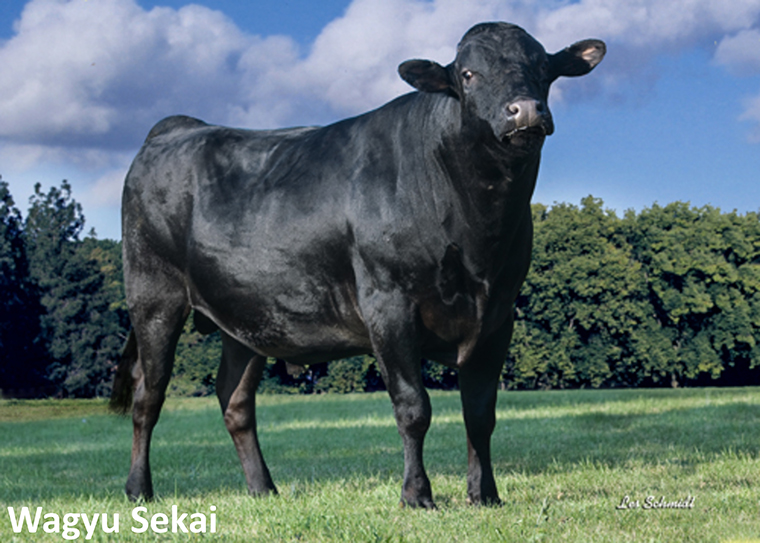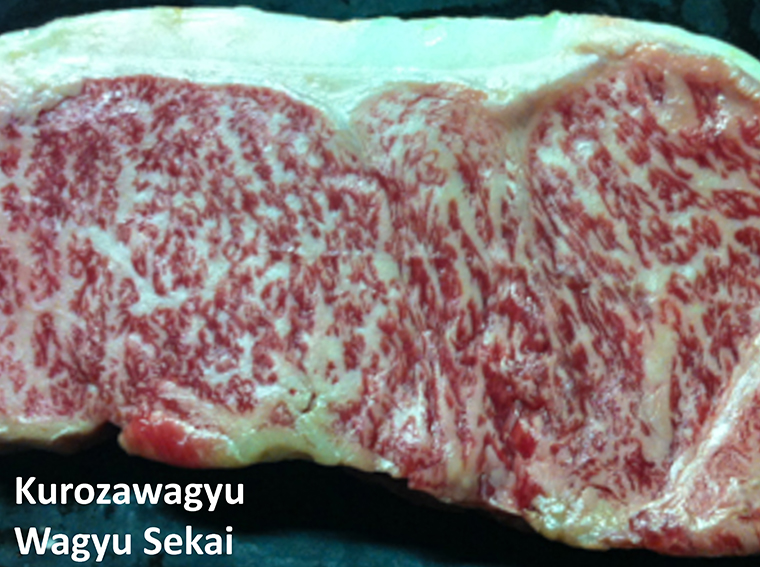Wagyu around the World - Canada
In the fall of 1991, the inaugural meeting of the Canadian Wagyu Association took place in Calgary. It took two years of intensive lobbying before the Association was incorporated.
Almost immediately, the Canadian Simmental Association was contracted to maintain the Canadian Wagyu Registry. At the 1994 Annual General Meeting, 84 animals had been registered and there were 54 members from breeders.
The Wagyu association in Canada is no longer active so producers in Canada either register their Wagyu in Australia or USA or in both.
'Wagyu Sekai Inc.' was established by Ken Kurosawatsu in Puslinch, Ontario, when the Holstein dairy enterprise diversified.
The search for Wagyu bloodlines to import began in early 1992 in Japan. The animals were hand selected by Ken's father based on their physical conformation with a strong emphasis placed on the strength of the maternal pedigree of each animal.
The pedigrees contain the most famous Wagyu sires in Japan such as Yasufuku, Monjiro, Shigeshigenami, Kikutani, Tanifuku Doi, Dai 7 Itozakura and Mitsufuku.
Since the Wagyu are considered to be a National Treasure in Japan, the Japanese were very reluctant to let these animals leave Japan. Finally in 1993, the first shipment of fullblood Wagyu left Japan to form the nucleus of the breeding herd in Canada after serving quarantine in USA.
Wagyu Sekai Inc. is proud to be the home of the first fullblood Wagyu born outside of Japan and the home  of the first fullblood Wagyu herd in Canada.
of the first fullblood Wagyu herd in Canada.
Ken spent four years in Japan learning the pedigrees, breeding combinations and feeding techniques.
His post secondary education was with Kenichi Ono learning the pedigrees and breeding combinations while working for Mannet Company Ltd in the shipment of exports from Japan. He also learnt the intricate art of feeding Wagyu while living on the farm Numata Chikusan feeding over 1,500 head of Wagyu Cattle in Hyogo Prefecture home of “Kobe Beef”.
“Kurozawagyu" is the brand name for the 100% Wagyu beef supplied by Wagyu Sekai in Canada. The final beef product is based on 70% genetics and 30% feeding technique so the cattle are selectively mated to ensure a quality beef product. All cattle are carefully raised from birth using special techniques developed in Japan and adopted in Canada.
As the animals are allowed to reach maturity naturally, no growth hormones or implants are used in any of the cattle and to ensure the highest quality Kurozawagyu, they are raised in a clean environment on a specially formulated diet produced on the farm. To go along with the high quality feeds, pure clean water is essential in the programme.
All aspects of the production of Kurozawagyu Beef  from conception to the “finished product” in an all natural feeding ration and rigid standards with proper genetic selection make Kurozawagyu Beef the ultimate dining experience.
from conception to the “finished product” in an all natural feeding ration and rigid standards with proper genetic selection make Kurozawagyu Beef the ultimate dining experience.
Black Wagyu and Red Wagyu/Akaushi embryos and semen are offered for purchase.
Patrick and Kimberley McCarthy are owners of "Canadian Wagyu Inc." in Camrose, Alberta. F1 and F2 Wagyu cross feeders are raised from predominantly Angus cross females.
The cattle are raised by Canadian Wagyu Inc. or by other producers under their programmes. Finishing is carried at selected feedlots and animals range from 20 to 34 months of age at slaughter. A special feeding program has been designed to resemble Japanese style feeding. Selected feed ingredients utilized in that ration are oats, barley, beet pulp, alfalfa pellets, supplement, barley straw, silage, salt, minerals, and fresh water. Vitamin E has been added to the ration to enhance shelf life and appearance of the post slaughter beef. Cattle are raised free from added hormones.
Boneless beef packs and carcasses are sold.
Genetics
High quality Wagyu genetics is bred in Canada. Exports come from Australia and USA and those producers also import from Canada.
The Canadian Wagyu Association no longer functions so breeders there are members of either the American Wagyu Association or the Australian Wagyu Association or both. Look at both those associations to locate Wagyu members in the provinces of Canada where you are looking for genetics or breeders.
The following semen is recommended for use in Fullblood Wagyu breeding or Wagyu cross/Fullblood production in Canada:
| NAME OF ANIMAL | COLOUR | TYPE | CONTACT |
| Lisheen N23 | Black | Semen | Lisheen Wagyu |
| Lisheen P26 | Black | Semen | Lisheen Wagyu |
| Lisheen Q39 | Black | Semen | Lisheen Wagyu |
| Trent Bridge F115 | Black | Semen | Wagyu Genetics Jerathe |
| WG Hirashiget 045 | Black | Semen | Wagyu Genetics Jerathe |
Click on the animal name above to see more information.
